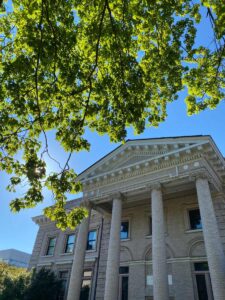The Graduate School and its Royster Society of Fellows held a robust discussion among members of the University of North Carolina at Chapel Hill community on Wednesday in part one of a two-part series to discuss shared governance and academic freedom in institutions of higher education in the United States.

Tori Ekstrand (‘03 Ph.D.), the Caroline H. and Thomas S. Royster Distinguished Professor for Graduate Education, and a professor in the UNC Hussman School of Journalism and Media, moderated the discussion.
Suzanne Barbour, dean of The Graduate School, said she intended for the panel discussion to illuminate and to explore the landscape of academic freedom and shared governance, inherently complex issues that are intertwined with each other and within the context of institutions, their histories, and with the law.
“We’re interested in what our panelists know these concepts to be in theory and in practice,” Barbour said. “We’re also curious to know how to unpack them and how we envision our university in the future.”
The panel discussion, co-sponsored by the Center for Media Law and Policy, occurred on First Amendment Day, an initiative of the Center and of the Hussman School.
Ekstrand noted a need to host discussions around the issues of shared governance and academic freedom, particularly among graduate students who may go on to institutions of higher education as they begin work in their discipline of study.
“So often, our graduates are well equipped to begin work in their disciplines,” Ekstrand said. … “We don’t do a lot of teaching around these principles. Our job today is to unravel that.”
Ekstrand said that there is often tension in institutions of higher education between shared governance—or the processes and structures, such as governments, faculty, and administration—and academic freedom of faculty to pursue and to share knowledge.
Many panelists agreed that establishing trust among stakeholders is key to productive conversation and in developing policies when shared governance and academic freedom are at play.
“At the very heart of academic freedom and shared governance is trust. It’s fundamental to the whole system,” said panelist Buck Goldstein ’70 (’76 JD), a professor of the practice in the UNC School of Education who specializes in higher education leadership.
Deen Freelon, an associate professor at the Hussman School, said the interplay of shared governance and academic freedom is at its strongest when stakeholders best understand each other’s incentives, reasoning, and decision-making processes.
“Trust can become especially strained when you’re talking about gaps of power,” Freelon said. “These sorts of gulfs in power tend to create trust difficulties.”
The panel discussed recent local events, such as how faculty issues of tenure affected the Hussman School and beyond.
Lindsie Rank (’18 MA; ’18 JD), a program officer with the Foundation for Individual Rights in Education (FIRE), said the balance of shared governance and academic freedom at institutions like UNC-Chapel Hill has evolved over time and has a decades-long history in our state that touches on issues of political polarization, censorship, and viewpoint diversity.
“When you have a strong sense of faculty governance, there’s not usually quite as much concern with ‘how does this make the school look?’ or ‘how does this affect the bottom line?” … “You have to have culture, but culture is often shaped by policy, and policy is shaped by culture,” Rank said. … “The best-case scenario is an institution that really values the research and teaching and expertise of its faculty both in policy but also in practice.”
Sallie Shuping-Russell ’77, the chair of Carolina Research Ventures and former UNC Board of Trustees member, advocated for better representation of the faculty in governing bodies, such as in an ex officio role.
“The product of the faculty is knowledge,” Russell said. “You have to have free thought in order to have new thoughts, and that’s the reason academic freedom is so important.”
Barbour credited the panelists with providing a forum to share multiple viewpoints on a complex topic.
“There’s never been a more important time for us to discuss these important issues,” she said.
Part two of the panel is scheduled for October 13 and is open to members of the UNC-Chapel Hill community. It will feature the following panelists:
- Neel Swamy; president, Graduate and Professional Student Government
- Martin Brinkley; dean, UNC School of Law
- Julia Sprunt Grumbles; Innovate Carolina
- Mimi Chapman; Professor in the UNC School of Social Work and chair of the faculty
- Hans-Joerg Tiede; senior program officer, American Association of University Professors
